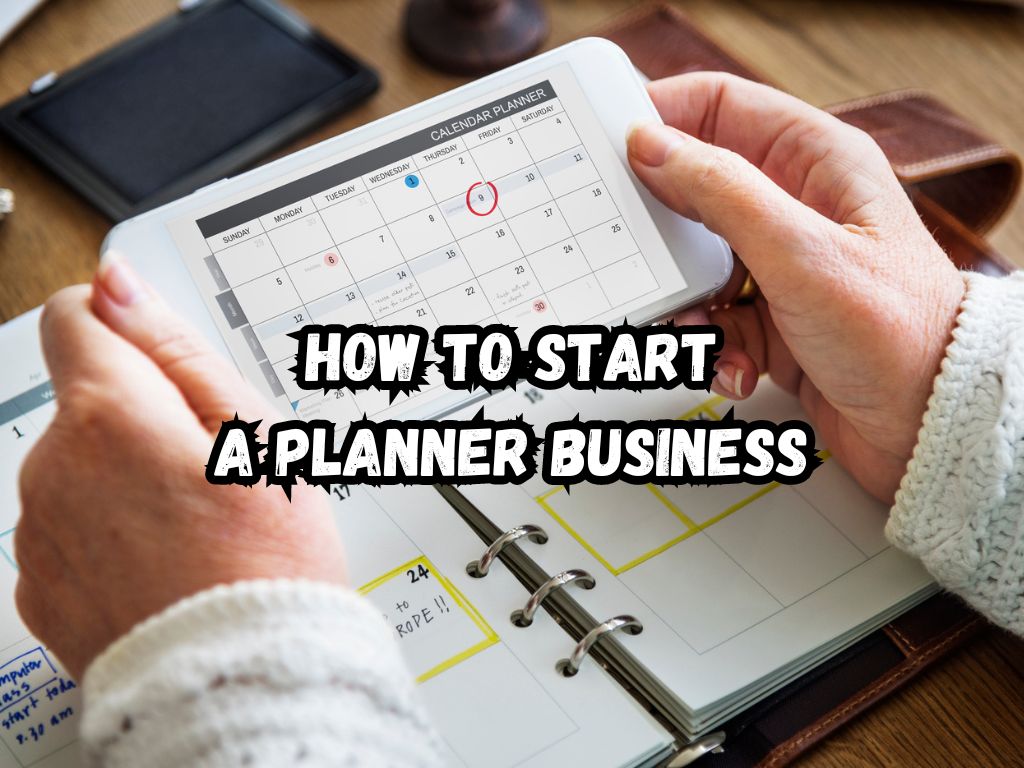Starting a planner business can be a rewarding venture for anyone with an eye for design and a passion for organization.
A thriving industry, the worldwide market for planners and organizers is growing steadily, propelled by rising consumer interest in personalized stationary.
Entering this landscape requires a good amount of planning and thorough understanding of your target market.
How To Start A Planner Business?
Market Research
Embarking on a venture in the planner business begins with market research. It’s crucial to keep an eye on current market trends, identify your target audience and assess your competition.
Analyze popular planner styles and features. Understand what consumers need and how they use their planners.
You should also study your competitors, pinpointing their strengths and weaknesses while finding ways to make your own products unique and compelling.

Business Planning
Every business starts with a plan. Your planner business is no exception. A detailed plan helps to set realistic goals, secure funding, and ensures you consider all essential aspects of your venture.
When it comes to financial planning, be sure to consider all costs thoroughly. These may include manufacturing, marketing, logistics, and operational costs.
Explore a range of funding options, from savings and loans to crowdfunding campaigns, choosing what works best for your situation.
Product Development
Next, let’s turn to product development. Planner designs vary widely, from daily to weekly to monthly formats, minimalist to elaborate themes, and even digital planners. Your designs should reflect the needs and tastes of your target market.
Remember, functionality is as important as aesthetics. Material selection also plays a critical role in your product development process.
Consider the quality, cost, availability, and sustainability of different materials. Also, identify potential manufacturers that can deliver the quality you need at a competitive price.
Branding and Marketing
Now it’s time to create your brand. Your business name must be original, relatable, and easy to remember. Make sure to take care of legal considerations such as registering your business name, securing necessary permits, and getting copyright protection.
Developing your brand identity, including your logo, color schemes, and overall brand messaging, is key to making your business stand out. Marketing your planner business is vital for its success.
Whether online or offline, your marketing strategy should aim to reach your target market effectively. Use social media to raise brand awareness, collaborate with influencers for greater reach, and employ SEO to drive more traffic to your online store.
Sales Channels
Deciding on the right sales channels can make a world of difference for your planner business. An e-commerce site offers a cost-effective way to reach a global audience, while a physical storefront can provide a hands-on experience for customers.
Whichever route you choose, ensure that your sales channels reflect your brand and cater to your customers’ shopping preferences. If you opt for e-commerce, there are various platforms you can benefit from, so choose one that fits your business’ needs.
Operations Management
Effective operations management is paramount for the smooth running of your planner business. This covers inventory management, logistics, customer service, and finance management.
Keeping a regular check on your stock levels, having a reliable delivery system, providing stellar customer service, and managing your finances diligently will help your business to operate efficiently.

Case Studies and Success Stories
Examining case studies of successful planner businesses provides valuable insights. Observe how they built their brands, marketed their products, and managed their operations. Take inspiration from their successes and also learn from the challenges they faced.
Frequently Asked Questions
How much initial investment is needed to start a planner business?
The initial investment for starting a planner business varies. It can range from a few hundred to several thousand dollars. For a small-scale operation, especially one that’s home-based and utilizes print-on-demand services, your initial costs may be lower, focusing on design software, a website, and sample printing.
If you opt for bulk production or hold inventory, costs rise significantly with manufacturing, material, storage, and shipping expenses. Also consider marketing, business registration, and insurance fees in your initial budget.
Can I start a planner business from home?
Yes, starting a planner business from home is entirely plausible. You can design planners, manage your business, and market your products all from a home office.
With digital tools and platforms, you can connect with suppliers, printers, and customers online. The primary considerations would be where to store inventory if you choose to keep stock and ensuring your workspace complies with any local zoning regulations that apply to home-based businesses.
What are the most effective marketing strategies for a planner business?
The most effective marketing strategies for a planner business often involve a mix of online and community-based efforts. Utilizing social media platforms helps create brand awareness and engagement.
Influencer partnerships can introduce your products to a broader audience. SEO ensures your website is discoverable to those searching for planners. Email marketing keeps customers informed and retargeted.
Additionally, attending craft fairs or local events brings your products to potential customers directly. Understanding your target demographic is crucial to tailor strategies effectively.
Conclusion
Starting a planner business may seem daunting, but with diligent planning, robust market research, effective marketing, and efficient operations management, you can build a competitive and profitable venture.
It’s a journey that requires hard work and commitment, but the reward is the opportunity to turn your passion into profit.


 Tags:
Tags:










